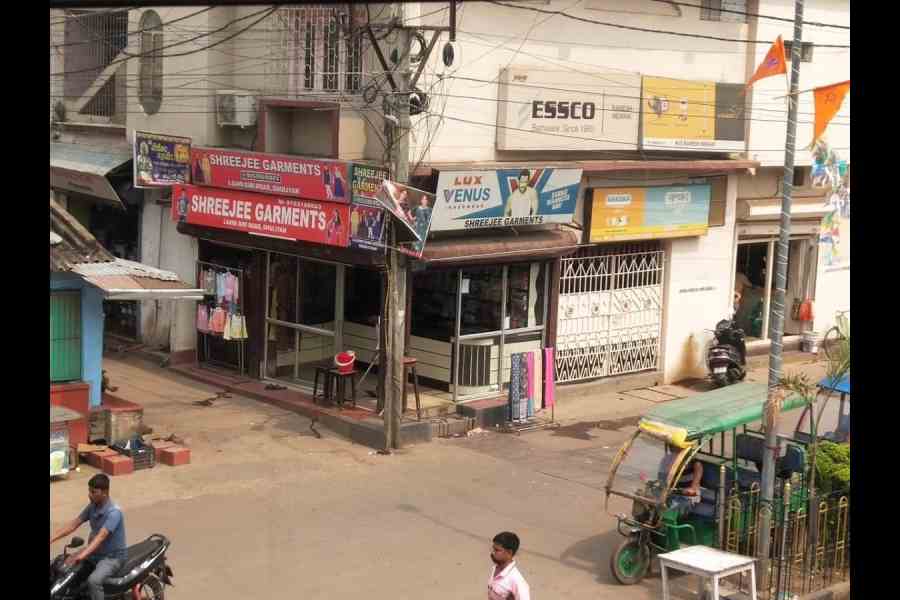The communal riots in Dhulian have failed to dim its Hindu traders’ enthusiasm for Eid.
The April 11 violence that marred Poila Baisakh business, destroying shops and closing markets, has left the predominantly Hindu and Jain traders of Murshidabad’s business hub of Dhulian pinning their hopes on Eid al-Azha, which falls in June.
The Muslim festival happens to be one of the peak seasons for business in the region, underscoring the ways in which the two communities’ lives and livelihoods remain intertwined despite the occasional flare-ups instigated by divisive forces.
With 80 per cent of the population being Muslim in violence-scarred Samserganj and Dhulian — and adjoining areas in Malda, Murshidabad and Pakur (Jharkhand) — Eid al-Fitr and Eid al-Azha are busy times for Dhulian’s retail and wholesale markets.
However, some traders are worried that the violence might cast a shadow on Eid al-Azha business too.
“The news of the violence, murders and arson has spread panic across the region, causing our customers to avoid Dhulian,” Ritesh Jain, a cloth merchant in the Bidhan Sarani area of Dhulian market, said.

Shops bereft of customers at Dhulian market in Murshidabad’s Samserganj on Sunday. Samim Aktar
“Although we have informed most of our regular customers that our shops have opened over the last two days and that the situation has improved, many say they have not regained the confidence to return,” he said.
Jain added: “If this doesn’t change within 10 days, we’ll be ruined. After the lacklustre business during Polia Baisakh, we cannot afford a dampened Eid al-Azha season, which remains key to the revival of our businesses.”
A handful of shops had opened on Poila Baisakh, April 15, but few customers turned up.
Hindus and Muslims had been staying away from each other’s areas in the immediate aftermath of the April 11 violence, triggered by a massive protest against the amended waqf law.
Local Hindus had restricted Muslims’ entry into the Dhulian market, where most of the traders are Hindu or Jain, mainly for fear of further attacks. The compulsions of livelihood have, however, caused a change of heart.
“Discord between religions and communities is always fuelled by outside forces. People in mixed-population areas survive by depending on each other,” Surajit C. Mukhopadhyay, a sociologist who has taught at several universities, said.
“The eagerness to do business during Eid al-Azha shows that livelihood always takes precedence over communal tension. This should be an eye-opener for all political parties.”
Although the festival is on June 6, multiple traders said that commerce needed to resume in earnest now since most small traders buy their stocks a month in advance. The fear is that if a chunk of their regular customers turn to markets in Malda or elsewhere, they might never come back.
Dhulian’s traders have, therefore, decided to request local lawmakers to visit villages in nearby Farakka and Suti to convince people about the improved situation and encourage them to resume visiting the Dhulian market.
“The administration and local lawmakers are urging us to reopen our shops, which is why most of the shops are open now,” said Ramesh Memani, Dhulian Byabsayee Samiti PRO.
“We want to request them (lawmakers) to visit the adjoining areas to assure people that it’s safe to shop here again.”
He added: “Dhulian’s cloth market is the biggest in the region, with hundreds of shops. So, we must make the most of the Eid al-Azha season. If we lose our customers once, they might choose alternative markets permanently.”
Traders said that shoes, mobile phones, utensils and furniture, apart from clothes, sell in large volumes during the festive season.
Jangipur MP Khalilur Rahaman, a Trinamool leader and Samserganj native, acknowledged the traders’ concern.
“The market has reopened fully on a request from us. Yes, customers are still avoiding Dhulian out of fear,” he said.
“We plan to visit nearby villages to rebuild confidence. Dhulian has always symbolised harmony, and we must work to restore it.”
Local Muslim businessmen share the same worries and have appealed for the swift restoration of peace.
“My stock is running out and I can’t go to Calcutta for bulk purchase. Eid is one of the occasions when thousands buy clothes from my shop,” said Md Waliul, who owns a garment store in Dhulian.










